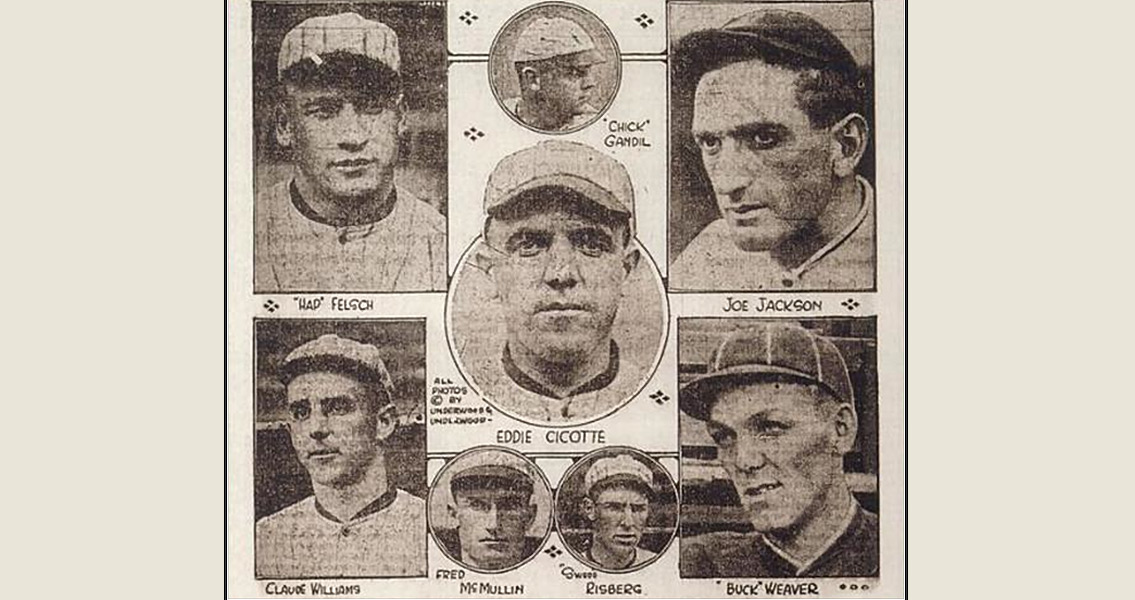<![CDATA[On 5th July 1921 the jury was sworn in to begin the trial of the 'Black Sox', baseball players for the Chicago White Sox who had allegedly been paid to throw the 1919 Baseball World Series. In total, eighteen were indicted, including several of the biggest stars in baseball as well as those who had supposedly paid the bribes. Eight players on the team were accused of being corrupt, pitchers Eddie Cicotte and Claude (“Lefty”) Williams, first baseman Arnold (“Chick”) Gandil, shortstop Charles (“Swede”) Risberg, third baseman George (“Buck”) Weaver, outfielders Joe (“Shoeless Joe”) Jackson and Oscar (“Happy”) Felsch, and utility infielder Fred McMullin. Records from the court suggest that the eight players, subsequently labelled the Black Sox by the press, had received between $70,000 and $100,000 to lose five games to three against their opponents, the Cincinnati Reds. In the weeks leading up to the 1919 World Series, bookies had the Chicago White Sox listed at odds of three to one to defeat the unfancied Cincinnati Reds. These odds shifted however, as massive bets started to get heaped on the Reds, and rumours spread that White Sox players were in the pay of high stakes gamblers. On 1st October the first game of the nine game World Series only seemed to confirm the rumours. The White Sox put in a disastrous performance, key players such as Cicotte uncharacteristically error prone. The Cincinnati Reds won the game 9 to 1; the Sox performance so bad the New York Times wrote "Never before in the history of America’s biggest baseball spectacle has a pennant-winning club received such a disastrous drubbing in an opening game…". The poor form continued, aside from a brief rally which saw the White Sox win two games, and by the eighth game the Reds had secured victory in the World Series. As soon as the Series was over sports writers in the US aired suspicions that corruption had been at play in the shock result, but the allegations had died down by the beginning of the following season. It was only after a grand jury had been called to investigate broader concerns over corruption in baseball that the full enormity of the Black Sox scandal came to light. In September 1920, Cicotte, Williams, Jackson and Felsch all admitted to having taken bribes to lose the World Series. How the 'Big Fix' was organised is still far from clear, thanks in part to the murky trial that followed. None of the gamblers accused of betting on the result were ever convicted, and details of how the bribes were financed is vague. Most accounts suggest that small time gambler Joseph Sullivan was the main trigger, meeting with Gandil several weeks before the series to arrange the deception. Many accounts suggest that a complicated web of businessmen and gangsters were recruited to fund the bribes, with notorious gambler, businessman and bootlegger Arnold Rothstein often labelled as one of the chief financiers of the scheme. Ultimately though, despite intense media and legal scrutiny neither Rothstein, or any others, could be tied to the scandal. On 3rd August 1921, all the Black Sox on trial were acquitted on the basis of insufficient evidence, a fact that highlighted the shocking lack of transparency in the whole affair. Each of the Black Sox had submitted written confessions, damning evidence that the Series had been thrown, yet by the time the trial came around these confessions had mysteriously disappeared. Although no one had been convicted of accepting or issuing bribes, the eight Black Sox were all banned from baseball for life following the trial, highlighting one of the many inconsistencies in the story of the 1919 World Series. To this day, the affair remains one of the murkiest in the history of sport, and the United States' criminal underworld. ]]>
The Murky Trial of the Black Sox Begins
